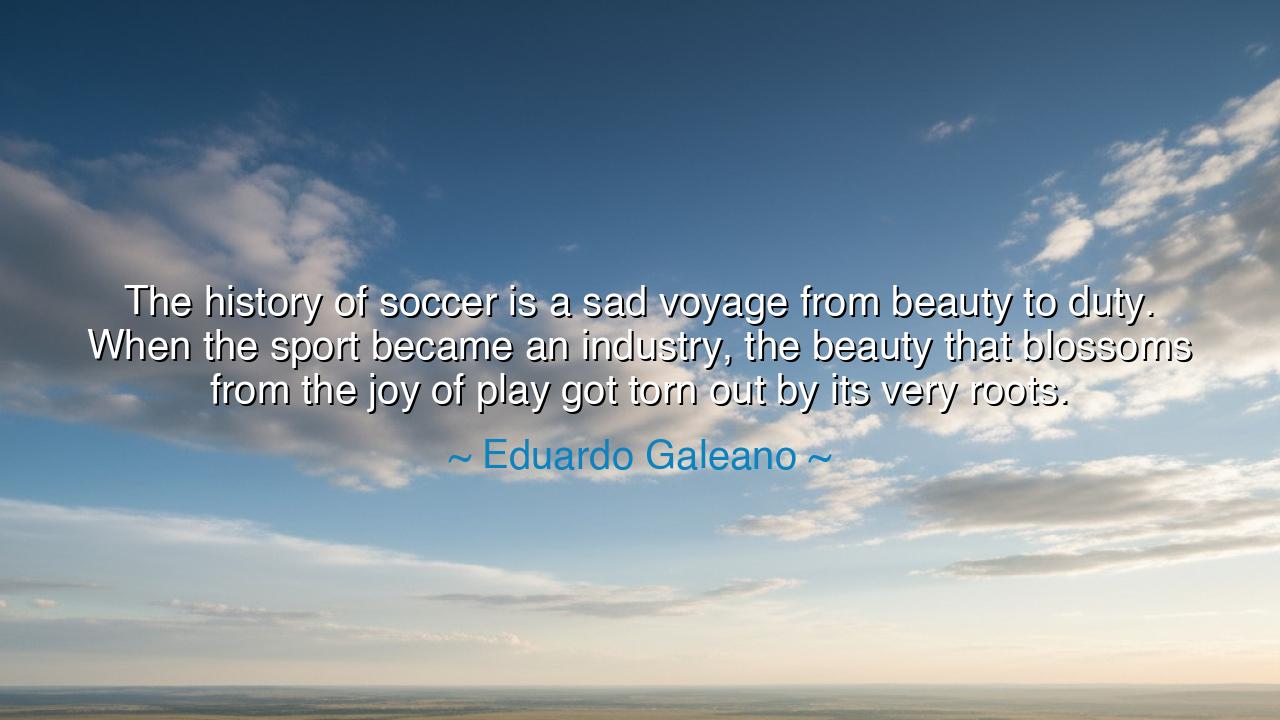
The history of soccer is a sad voyage from beauty to duty. When
The history of soccer is a sad voyage from beauty to duty. When the sport became an industry, the beauty that blossoms from the joy of play got torn out by its very roots.






Hear the voice of Eduardo Galeano, who looked upon the field of sport and spoke with lament: “The history of soccer is a sad voyage from beauty to duty. When the sport became an industry, the beauty that blossoms from the joy of play got torn out by its very roots.” These words do not merely describe a game, but the transformation of a human art. For what began as delight, as laughter in the streets and poetry in motion, was gradually shackled by money, rules, and the hunger of profit.
The beauty of soccer was born in simplicity. A ball, a patch of earth, bare feet, and the boundless imagination of children—that was its origin. The joy of play was not measured in contracts or trophies, but in freedom, in the dance of bodies and the rhythm of the game itself. In these beginnings, soccer was closer to ritual than to industry, a celebration of skill, spontaneity, and creativity. The poor in alleys and fields played it with as much passion as kings and nobles, for the ball belonged to all.
But with time, as Galeano laments, this beauty was replaced with duty. Where once there was improvisation, there came rigid systems. Where once the players danced, they now labored. Coaches, corporations, and financiers remade the game into a machine. Players were no longer free spirits, but workers in an industry of billions, bound to perform not for joy, but for obligation. The crowd still cheered, but something was lost: the unrestrained soul of the game, torn up “by its very roots.”
History has shown this pattern not only in sport, but in all human endeavors. Consider the Olympic Games of ancient Greece. They began as sacred festivals, celebrations of body and spirit, offerings to the gods in the form of human excellence. But as time passed, they too became corrupted by politics, bribery, and ambition. The beauty of competition was weighed down by the duty of spectacle. What had been a free expression of human strength and artistry became an instrument of power and prestige.
And yet, the heart of Galeano’s sorrow is also his hope. For though the industry may overshadow the game, the beauty is never fully destroyed. In the slums of Rio, in the dusty fields of Africa, in the parks of Europe, children still chase the ball with wild abandon. There, the joy of play still blossoms. No corporate interest can buy the laughter of the barefoot child who scores a goal and runs as if the earth itself were applauding. The roots are resilient, and though they may be cut, they grow again in unexpected places.
The lesson is this: guard the beauty of what you love. When joy becomes duty, when play becomes obligation, when passion becomes machinery, something vital is lost. In every life, whether in sport, in art, or in labor, we must remember why we began. Was it for wealth? Or was it for the simple delight of creation, of freedom, of life itself? To forget this is to live as slaves; to remember it is to live as children once more, laughing at the game.
Therefore, let all who hear take this counsel: if you play, play with joy. If you work, do not let work consume the spirit that first led you to it. Seek always to preserve the beauty within your craft, whether it be in a game, a song, or a deed of kindness. Resist the reduction of your passion into mere industry, for while money may build empires, only joy can build the soul.
Thus, the teaching endures: the sad voyage from beauty to duty is the story of humanity’s forgetfulness. Yet the voyage back, from duty to beauty, is always possible. The ball still rolls, the child still runs, and the spirit of play still waits to be remembered. To honor it is to reclaim not only the game, but life itself.






AAdministratorAdministrator
Welcome, honored guests. Please leave a comment, we will respond soon